84 F. average high for July 9.
88 F. high temperature on July 9, 2011.
2012: warmest first 6 months of any year on record. NOAA.
Last 12 months: warmest 1-year period since 1895 across the USA (NOAA).
10 warmest 12-month periods on record (1895-present) all occurred since 2000. Source: NOAA.
Hottest heat wave on record for Washington D.C. The scope and intensity of last week's heat was even worse than 1930. Details from The Washington Post below.

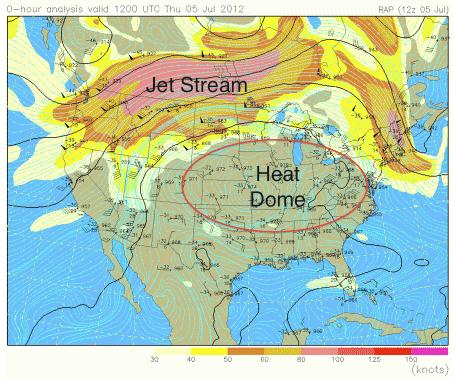
3,282 daily heat records broken or tied during June across the USA. 173 of these were all-time highs.
9,800 daily heat records broken or tied during June, 1988. Source (and map above): Climate Central - details below.
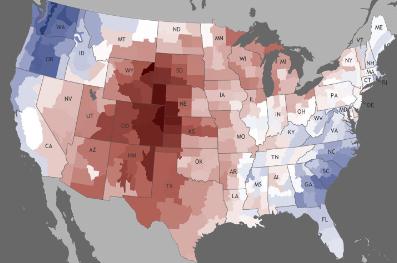

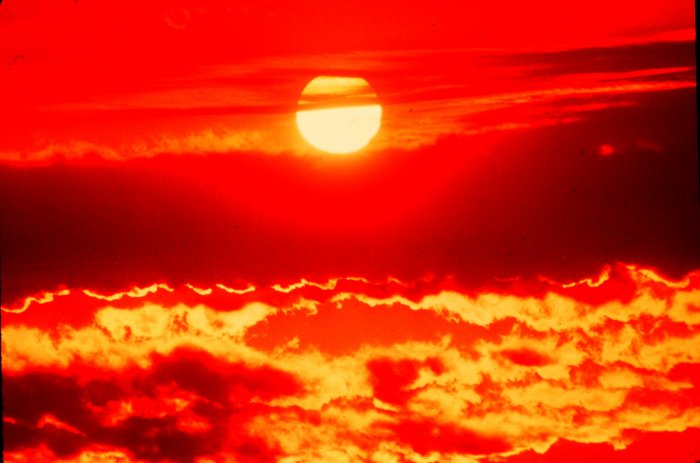
“The drought is much worse than last year and approaching the 1988 disaster,” said John Cory, the chief executive officer of Rochester, Indiana-based grain processor Prairie Mills Products LLC. “There are crops that won’t make it. The dairy and livestock industries are going to get hit very hard. People are just beginning to realize the depth of the problem.” - from a Bloomberg Businessweek story on the spreading drought; more information below.
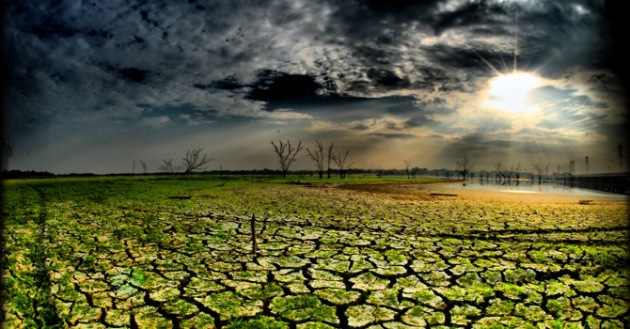
"An Oxfam report also notes that “this could be just a taste of things to come because in the next few decades the build-up of greenhouse gases already in the atmosphere could greatly increase the risk of droughts, flooding, pest infestation and water scarcity for agriculture systems already under tremendous stress." - from a story on climate change impacting agriculture and food production from journalstar.com; details below.
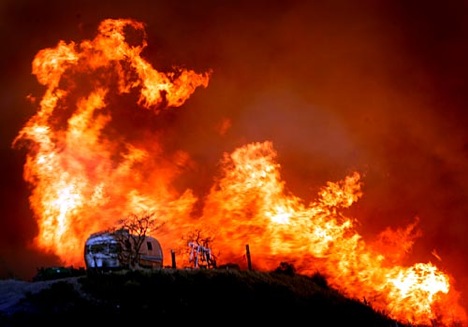
"The U.S. Global Change Research Program recently concluded: "Human-induced climate change appears to be well underway in the Southwest." It reported that in the West "both the frequency of large wildfires and the length of the fire season have increased substantially in recent decades, due primarily to earlier spring snowmelt and higher spring and summer temperatures." - from a Huffington Post story on wildfires and climate change; details below.
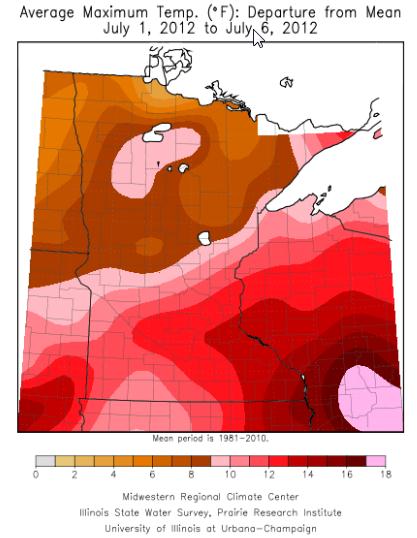
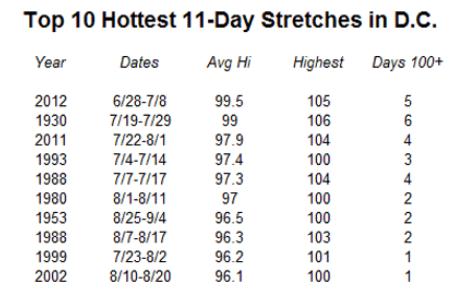
Graphic credit above: "Hottest 11-day stretches in D.C. using daily maximum temperatures."
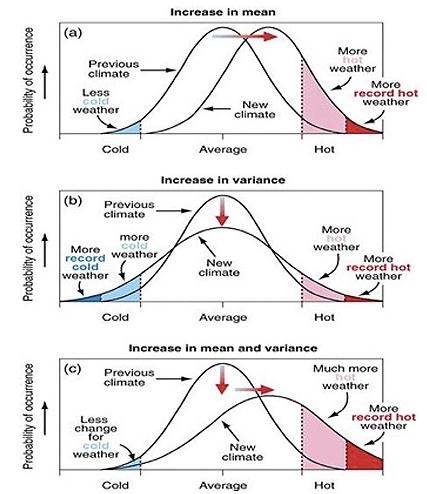
Graph credit above: "An illustration from the U.N. Intergovernmental Panel on Climate Change (IPCC), illustrating how a shift in mean temperature makes warm temperature extremes more likely to occur."
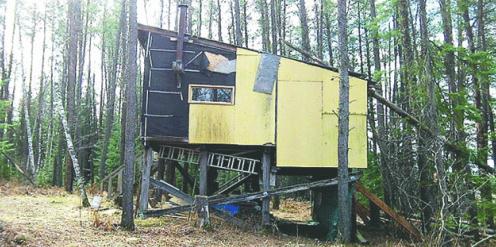
Photo credit above: "This 20-by-18-foot deer “stand” was built on St. Louis County forestland. County land managers say they want to limit the size and nature of deer stands while banning the cutting of trees for shooting lanes and the planting of food plots." (St. Louis County Department of Lands and Mines photo).
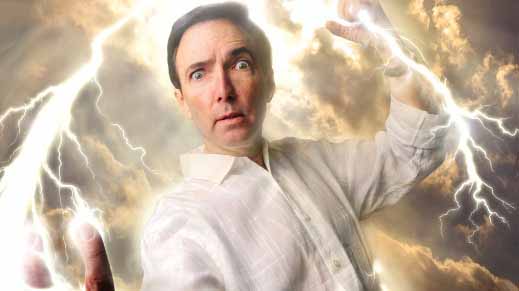
Paul,
"I read your column with interest many mornings in the Strib. I have a deep concern for the environment believing in "creation care" from a Christian viewpoint. I have spent my career working for non-profits - currently am serving a large church in the NW metro - and have limited income but would love to spend some money to save money as well as cut down significantly my family's energy use. But I do care and wonder what I can do? Do you have any website or local organizations that I can look into? Let me know if you have any thoughts for me. Appreciate your blog. I think it would be helpful to offer not only analysis - which is grim - but encouragement to take steps to change the future. One last question. I have a 9 year old who has a huge interest in the weather - mostly out of self preservation (she's afraid of storms) - and she's our weather watcher. Do you ever do introductory teachings on the weather or know how a 9 year old could get a tour or something? We'd love any ideas you have for us."
Thanks
Brian Houts
"I read your column with interest many mornings in the Strib. I have a deep concern for the environment believing in "creation care" from a Christian viewpoint. I have spent my career working for non-profits - currently am serving a large church in the NW metro - and have limited income but would love to spend some money to save money as well as cut down significantly my family's energy use. But I do care and wonder what I can do? Do you have any website or local organizations that I can look into? Let me know if you have any thoughts for me. Appreciate your blog. I think it would be helpful to offer not only analysis - which is grim - but encouragement to take steps to change the future. One last question. I have a 9 year old who has a huge interest in the weather - mostly out of self preservation (she's afraid of storms) - and she's our weather watcher. Do you ever do introductory teachings on the weather or know how a 9 year old could get a tour or something? We'd love any ideas you have for us."
Thanks
Brian Houts

Brain - thank you for your efforts. I'm a Christian too, and I take my role as a steward of creation seriously. There are some things you can do. Pick up a copy of "Cooler - Smarter" from the Union of Concerned Scientists for practical tips. A pdf sample is here. No, I don't get a commission. Have a goal of reducing your carbon footprint by 20% Tell coworkers, friends and family what you're doing, and why. We need a bottom-up approach. Although governments will ultimately put a price on carbon, true solutions will come from all of us, working together. I understand the reality: climate change is a depressing topic. There is no easy fix, no silver bullet. But there is plenty of (green) buckshot. The only thing we lack is the (political) will to scale these solutions on a national or international scale. But that doesn't mean we can't start now, with our own homes and neighborhoods.
Here is a great interactive web tool from UCS, the Union of Concerned Scientists, to give you more ideas for how you can lower your carbon footprint, while simultaneously saving money:
http://www.ucsusa.org/global_warming/what_you_can_do/practical-steps-for-low-carbon-living.html
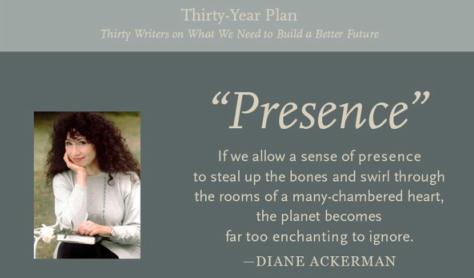
____________________________________________________________________________
Paul,
"That was an interesting piece that you reference (in Monday's weather blog) about the Chicago weatherman inteverviewed on PBS. Not having seen the episode, and not knowing the meteorologists personally, the thought that came to my mind was that perhaps they aren't allowed to talk about climate change as station policy (hmm, perhaps advertisers won't accept it). Is there any other plausible explanation for the collective throwing up of their hands? Can they really not see any link between a heating climate and high-energy weather? I continue to appreciate your thoughtful, insightful and apparently courageous reporting."
Respectfully,
"That was an interesting piece that you reference (in Monday's weather blog) about the Chicago weatherman inteverviewed on PBS. Not having seen the episode, and not knowing the meteorologists personally, the thought that came to my mind was that perhaps they aren't allowed to talk about climate change as station policy (hmm, perhaps advertisers won't accept it). Is there any other plausible explanation for the collective throwing up of their hands? Can they really not see any link between a heating climate and high-energy weather? I continue to appreciate your thoughtful, insightful and apparently courageous reporting."
Respectfully,
Jeff
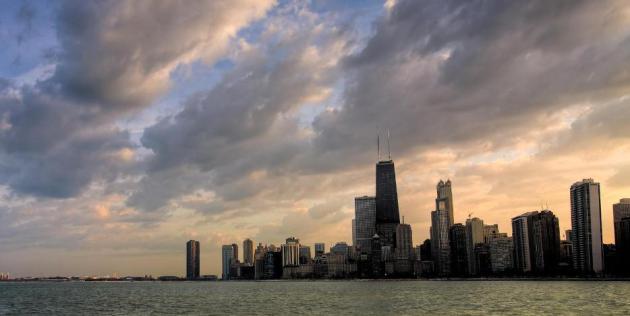
Of all the meteorologists in Chicago, the one I
have the most respect for is Tom Skilling. To be fair, I don't know his
position (wrong word) on climate change. Tom is incredibly bright and
well read, I can't believe that he would deny the overwhelming body of
science. But here's the deal: local television has become a popularity
contest. People watch their favorite anchors, reporters and, yes,
meteorologists. Q Scores, a measure of popularity, are critical. On air
talent is constantly researched. My previous employer shared bits and
pieces of the research - it was pretty clear to me that by taking a
stand on climate change I was alienating more conservative viewers.
Climate change is kryptonite for TV meteorologists.
By even bringing up the topic you just know that you're going to
alienate some percentage of the audience, who still links AGW with Al
Gore and "climategate" and conspiracy theories. In the back of our
minds: ratings. If 2 out of 10, or maybe 4 out of 10
people are skeptical/resistant to this topic, why even bring it up and
risk that...they won't like me? That's the calculus that goes through
our minds. If the ratings go down, everyone looks for work. Why risk
pissing people off? It's easier sticking with safe topics, like dew
point and hot weather survival tips. Easier to joke with the anchorman
than bring up a topic that inspires a). dread, and b). rage.
I'm as skeptical as the next guy. In the 80s I
thought James Hansen at NASA was over-hyping the role of climate change.
But by the mid 90s I was seeing things on the weather maps that fell
outside the normal swings of "weather" - stuff I couldn't explain. More
intense rains, more hail, fickle winters, higher summer humidities, far
fewer arctic outbreaks. I respond to data, and the facts on the ground
were telling me that the climate scientists were probably right. The
other problem: more TV meteorologists are given 2-4 minutes to report
the weather. It's really tough, in that kind of format, to explain
climate science and tie it into the regular weather segment. Don Shelby
(who was initially skeptical about climate change too) and I tried to
reference it from time to time, but again, there was amazing push-back.
To their credit, management never said "don't talk about climate change
on the air". They never tried to self-censor. But on some level, we just
knew that by even bringing it up we'd be accused of "buying into the
liberal hype" of AGW. It's really quite amazing. On some level I get it.
It's easier to deny than accept the truth, that actions have
consequences. Our consumption-based lifestyle and addiction to fossil
fuels has warmed the atmosphere, and that has implications. We can still
mitigate some of the worst effects in the decades to come, but there's
now no doubt in my mind that, as a nation, we're going to have to adapt
to this brave new world.
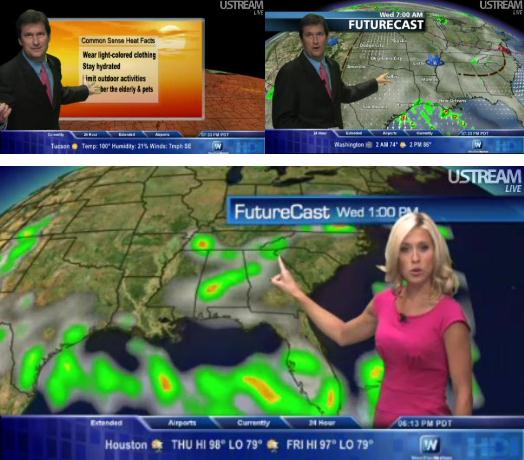
Paul-
"The main question I have is this: Why are so
many weather forecasters in our public media so reluctant to endorse the
reality of global warming (climate change)?
A related question: What percentage of
forecasters do you estimate support the concept of global warming, and
actively inform the public, as you do regularly?
My wife and I very much appreciate your taking a
strong position on this topic and continuing to hammer home the reality
of global warming, backed up splendidly with scientific data and
illustrations. We subscribe to the daily email delivery of Climate
Progress, which continues to inform readers of global warming's dire
consequences, especially in connection with growing human population,
which leads to increased consumption of natural resources.
As avid environmental activists, we are using
our musical skills to promote environmental and socio-political
concerns, primarily via Eco Songs: Promoting Sustainability Through the
Arts. We are also active in spearheading sustainability issues through
the Green Committee of our condo association and a newly formed Citizens
for Community Resilience and Sustainability group in St. Anthony. A
group of five founding members created Insight Forum: Understanding and
Preparing for a Future of Converging Crises (a 5-part video on YouTube),
which we use as an introductory educational tool.
Please continue your greatly needed leadership
in calling attention to this crucial issue. We only hope the mainstream
media will get more involved in connecting the dots between global
warming, the worldwide economic slowdown, widespread social unrest, and
ongoing depletion of natural resources, including energy fossil fuels,
arable lands, and wildlife.
Thank you, thank you for all you do!"
Clif and Bettye Ware
Professor Emeritus (voice). University of Minnesota, Twin Cities
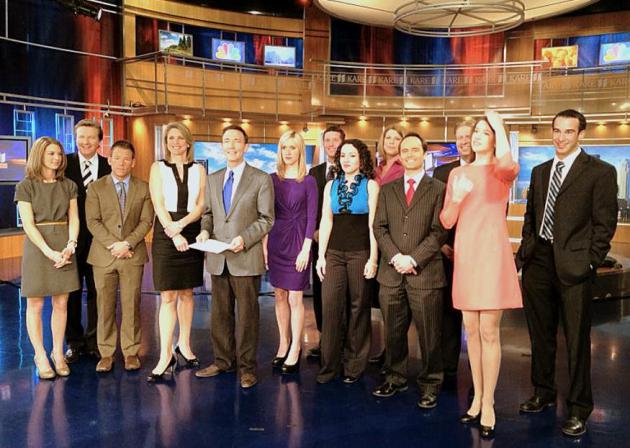
I sense a slow turning of the tide. As I mentioned
in a recent column, the weather is accomplishing what climate scientists
couldn't: convincing many Americans (those who still respond to logic,
reason and data) that something is up - it's not your grandfather's
weather pattern anymore. One blazing heat wave doesn't prove anything.
But our recent heat is only one puzzle piece. It's an entire orchestra
of weather oddities (playing out of tune, and loudly!) The pieces of the
puzzle are coming together and most people can see the outline of what
is emerging, and it's troubling. It's an accumulation of coincidences,
and what's unfolding is precisely what climate scientists predicted more
than 30 years ago.
I asked Brad Johnson, from "Forecast The Facts",
a relatively new organization pushing the envelope, encouraging all TV
meteorologists to report the science, not ideology or political talking
points. Here was his response to your question:

"The best information we have about that is from Ed Maibach's 2010 George Mason University poll:
More than half of our respondents (54%)
indicated that global warming is happening, 25% indicated it isn’t, and
21% say they don’t know yet. About one-third (31%) reported that global
warming is caused mostly by human activities, while almost two-thirds
(63%) reported it is caused mostly by natural changes in the
environment. In addition, Forecast the Facts has compiled a database of
72 local TV meteorologists who publicly question the science of climate
change. We don't have a public listing but we do display their comments:
When I was with ThinkProgress, I did research to compile a list of about 50 quotes:"
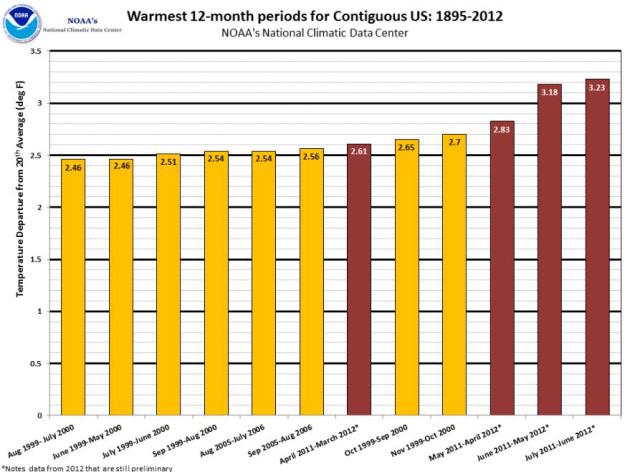
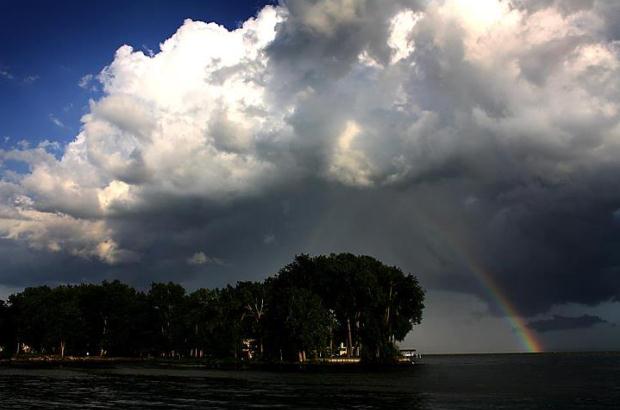
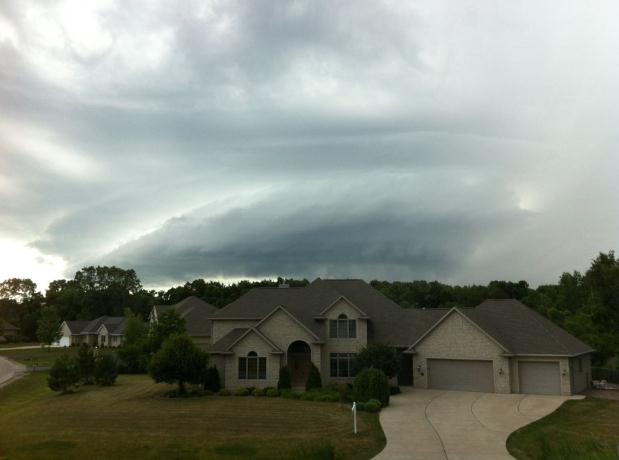

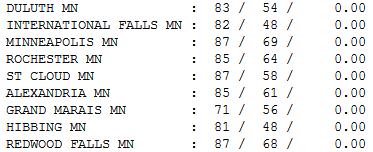
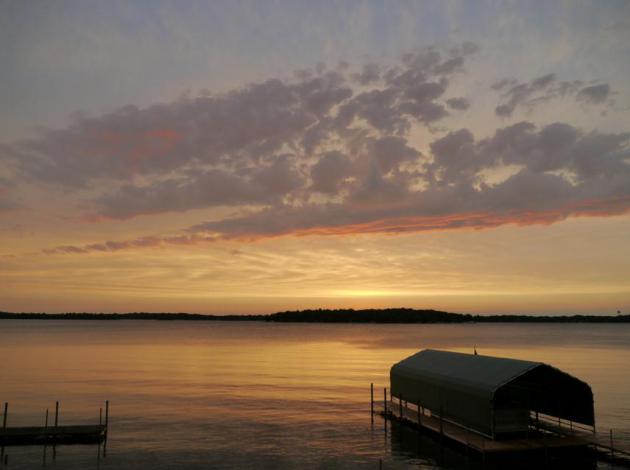
Paul's Conservation Minnesota Outlook for the Twin Cities and all of Minnesota:
TODAY: Sunny & pleasant. Dew point: 57. Winds: SE 3-8. High: 85
TUESDAY NIGHT: Clear, still comfortable. Low: 64
WEDNESDAY: Warm sun, still quiet. Dew point: 59. High: 87
THURSDAY: Partly sunny, warmer. Dew point: 61. Low: 65. High: 88
FRIDAY: Sticky, stray T-storm. Dew point: 63. Low: 65. High: 87
SATURDAY: Hazy sun, few storms. Dew point: 65. Low: 67. High: 86
SUNDAY: Sunnier, drier, probably hotter. Dew point: 68. Low: 69. High: 90
MONDAY: Sizzling again. More dog days. Low: 71. High: 94
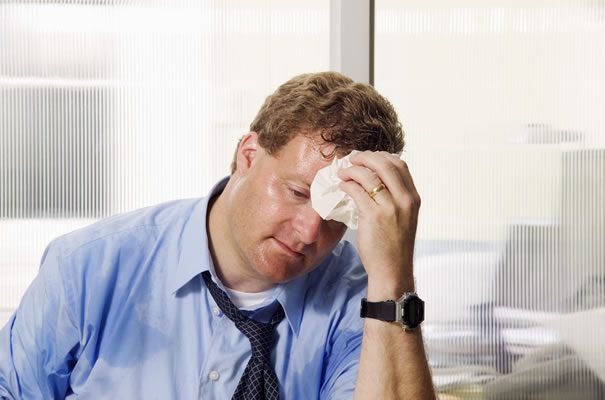
A Sweaty Weatherguy
The heat wave got personal yesterday. Our 25
year old air conditioner died in a screaming blaze of glory. Last week
the A/C units in our studios failed, along with 2 emergency generators.
What are the odds of that?
Recent heat was historic, but not unprecedented -
ranked right up there with 1988 and 1934. Dust Bowl hot. What struck me
was not only the scale and intensity of the heat, but that it came so
early in the summer season. Dew points are higher now; 70 F. the new
summer norm, making for much higher heat indices than during the
mega-drought and heat wave of 1988.
Enjoy the fresh Canadian air while you can; no
puddles (or wailing sirens) through Friday. A few T-storms are possible
by Friday, spilling over into Saturday, but no widespread monsoon rains
in sight.
The European (ECMWF) model has been doing a good
job tipping me off about upcoming heat spikes some 4-8 days in advance.
We may see 90-95 F by the weekend, and the model is hinting at highs in
the low to mid 90s again early next week. Not record territory, but
hot enough.
30 days above 90 F. this summer? Starting to think so - we're already up to 17 days. Average is 13, if anyone asks. Doubtful.
A mostly-sweaty long range outlook. I'm going
old school until further notice. A sturdy fan and a window. I'll be the
sweaty weatherguy, pointing toward Canada, hoping for a little relief...
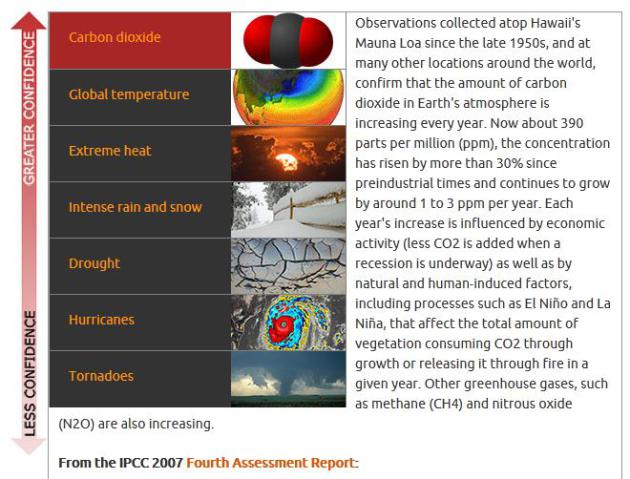
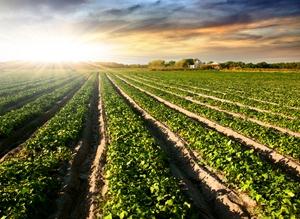
Here are some facts:
• The 2011, Texas drought cost a record $8 billion in crop and livestock losses and up to 500 million forest trees died. Urban forests lost another 5.6 million trees, along with $280 million in economic and environmental values.
• Extremely hot summers that once covered less than 1 percent of Earth’s surface (from 1951-1980), “now covers about 10 percent of the land area,” according to one analysis. “We conclude that extreme heat waves, such as that in Texas and Oklahoma in 2011 and Moscow in 2010, were caused by global warming.”
• The Earth Policy Institute of Washington, D.C., warns that long-term food trends are worrisome, especially for soybeans. In 1955, “China produced the same amount of soybeans it consumed, but since then production has stayed the same and consumption has jumped fivefold.”
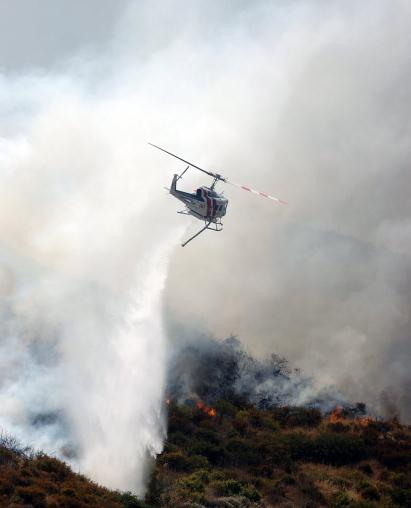
Photo credit above: "A helicopter drops water on a wildfire at Waterman Canyon Monday July 9, 2012 in the San Bernardino, Calif., The fire erupted shortly before 2 p.m. Monday along Highway 18 in Waterman Canyon, where residents have been asked to voluntarily leave." (AP Photo/San Bernardino Sun, LaFonzo Carter)
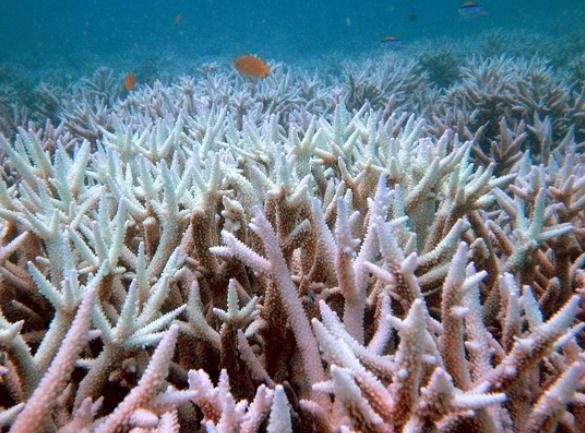
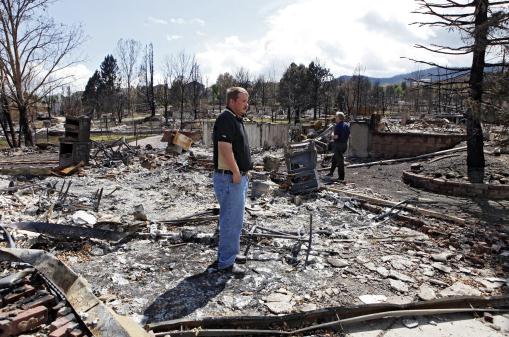
Photo credit above: "Members of FEMA and the Small Business administration look at a burned home in Colorado Springs, Colo., on Monday, July 9, 2012. Members of FEMA, the SBA and Colorado's Disaster Office assessed damages in the area burned by the Waldo Canyon wildfire." (AP Photo/Ed Andrieski)
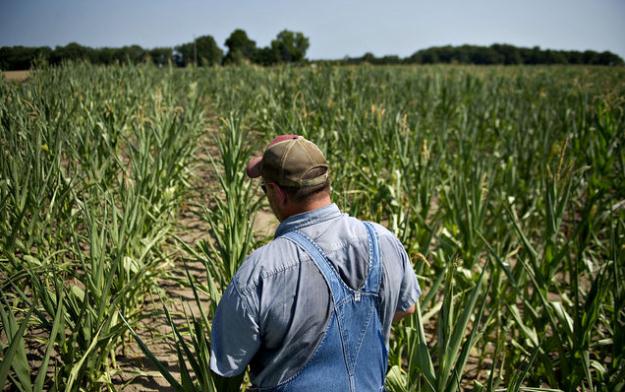
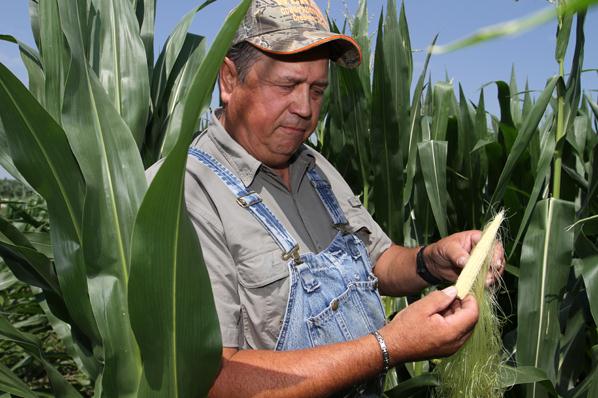
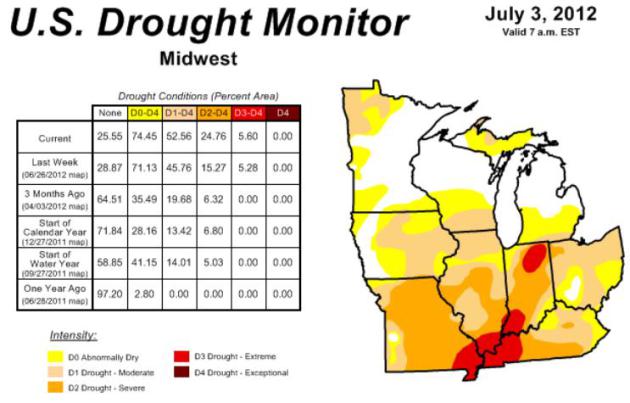
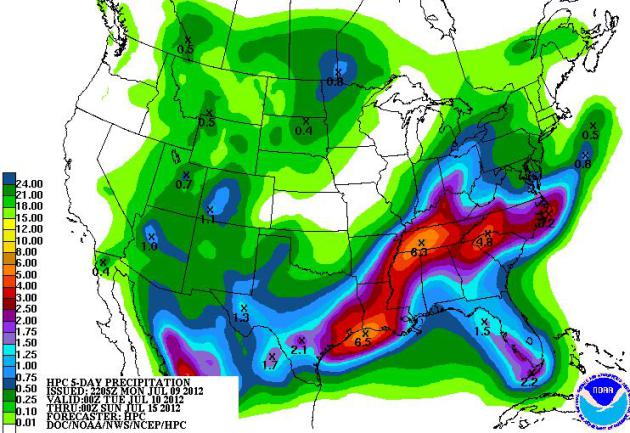
No comments:
Post a Comment